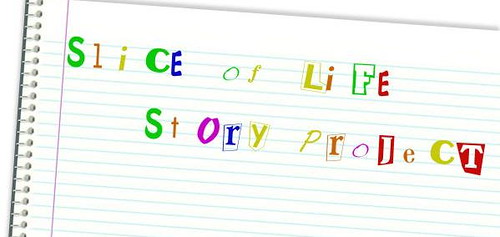
(This is part of the Slice of Life Project)
I was so much more of a writer than a teacher yesterday. What a great feeling.
After my students finished up presenting their expository paragraphs on “how to do … something” (ranging from how to play Guitar Hero to how to start a zoo to how to draw a cow to how to avoid joining a gang), we entered into freewrite time. The instructions? Just write. Write whatever you want, in whatever genre you want, on whatever topic you want. Just write.
The room was so quiet. And I was right there with them, sitting amidst their desks with my notebook open and pen in hand, scribbling away. Gosh, I wish every day could be like that. We didn’t share (OK. I miss that doorway into their private universe but I am willing to give that up once in a while in exchange for what was happening right then and there). We didn’t revise. We didn’t talk. All we did was write.
And so, I present the poems that I wrote over the course of the day. They are still sort of rough, but they can go into my bin of poems that were formed during my OnePoemEveryMonthforaYear project.
First, I wrote a serious poem as I watched my students in the act and I thought about the quiet revolution going on in my classroom.
Entering into Freewrite
Listen to the poem as podcast
I’m listening to pens – the words have no sound –
It’s all thoughts on the page.
These quiet moments are delicate pockets of complete freedom,
encouraging composition of poems, stories, plays, songs
and even comics –
They write with heads bowed and eyes focused;
Some move lips to mouth the words;
A silent incantation springing forth from mind to paper and back again.
I move among them as a ghost – a spiritual companion –
writing my own poem about them, writing,
in a sort of tacit recognition that what they do here has meaning,
even if the only eyes ever to read their words are their own,
and only their own.
We move on this journey, together,
as writers.
Then, I wrote these haikus. I am calling them, ahem, Haikus Inside the Classroom. I was really thinking about some of my individual students as I wrote and also about the classroom atmosphere.
Haikus Inside the Classroom
Listen to the poem as podcastInk never runs dry
when dipped in wonder and joy
…the silent boy dreamsShe’s thinking of home;
A family of cold winter
That shivers her bonesOutside noise comes in
on a wave of disruption
and they ride it hardSyllables slip by
eluding capture, escape
beyond my fingersIf I could sing songs
I’d sing in celebration
0f every writer
Finally, I wrote this poem about Quidditch (see yesterday’s post) in a humorous mood. I was thinking along the lines of James Prelutsky, I think. Just a version of the couplet.
This Game We Play
Listen to the poem as podcastIf every day was Quidditch, this place would be a mess
There’d be kids up on the ceilings and we’d have no need for desks
There’d be quaffles in the kitchen; There’d be snitches in the air
There’d be bludgers in the hallways and we really wouldn’t care
‘cause the game we play called Quidditch is all about the team
It’s a bevy of excitement (just listen to them scream)
You could say we might go crazy; you could say we’ll lose our minds
But I tell you, ever truthful, it’s an exhilarating time.
Peace (in poetry),
Kevin
PS — I stumbled on this fantastic poetry site called Poetry Archive, where famous and not-so-famous poets are reading their own poems. Here, for example, is one from the wonderful Billy Collins, reading his poem to his reader called “You, Reader.”

